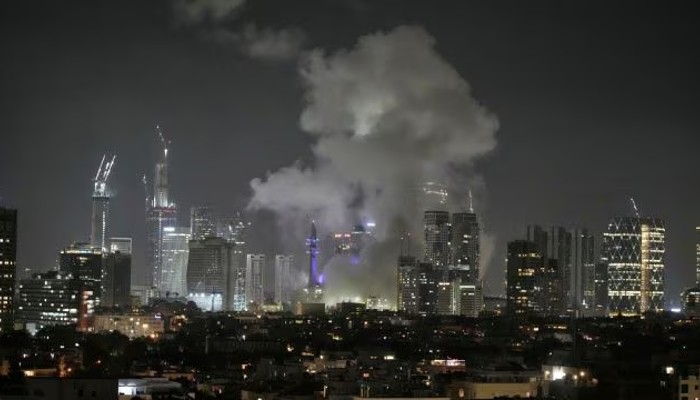Israel-Iran Conflict Escalates: Missiles Exchanged Amidst Mossad-Led Strikes

Smoke rises after a missile attack in Tel Aviv, Israel.
Tensions soar as Israel and Iran exchange missile strikes. Israel targets nuclear sites, Iran retaliates with ballistic missile barrage, raising war fears.
In a sharp escalation of hostilities, Israeli forces have struck more than 200 sites across Iran, including critical nuclear and military facilities. Among the targets hit was Iran’s Fordow nuclear site, located near the city of Qom. Explosions were reported around the capital Tehran, as well as near Isfahan, another key location in Iran’s nuclear programme.
Israel's air offensive, which began early Friday, involved more than 200 aircraft and marked one of the most extensive military operations conducted by the country in recent decades. According to Israeli officials, the strikes were aimed at dismantling Iran’s nuclear development infrastructure and eliminating top military leadership.
Among those killed were senior commanders of Iran’s armed forces, including General Hossein Salami, the head of the Islamic Revolutionary Guard Corps, and General Mohammad Bagheri, chief of staff of the Iranian military. Several top nuclear scientists, including Fereydoon Abbasi and Mohsen Fakhrizadeh, also reportedly died in the attacks. Iranian state media confirmed the deaths.
In response, Iran launched a barrage of ballistic missiles toward Israeli cities, including Tel Aviv and Jerusalem. Sirens blared across major urban centres on Friday night, and residents were advised to seek shelter as air defence systems attempted to intercept incoming projectiles. Iran's official news agency IRNA reported that the retaliatory strikes were a direct response to what Supreme Leader Ayatollah Ali Khamenei described as "Israel’s initiation of war on Iranian soil."
“This crime committed in our beloved country shows the true face of the Zionist regime,” Khamenei said in a televised address. “This aggression will not go unanswered.”
The Iranian attack came just hours after Israeli aircraft returned from their missions unscathed—something that officials credited to extensive intelligence groundwork laid by Israel’s foreign intelligence service, the Mossad.
Mossad's Role Highlighted
Security officials said Mossad operatives had prepared the battlefield for weeks, if not months. Weapons were reportedly smuggled into Iran and precision-guided systems were positioned near Iranian missile launchers. The Israeli intelligence agency also established a drone base inside Iran, allowing for targeted strikes on key defences ahead of the air raids.
Footage released by Mossad appeared to show drones striking Iranian missile systems in real-time, a rare public disclosure of the agency’s covert activities. Analysts say the success of the operation underlines the depth of Mossad’s penetration into Iran’s security apparatus.
“Israel has effectively turned Iran into its playground,” said Holly Dagres, a senior fellow at the Washington Institute. “From sabotage to assassination, Mossad has demonstrated unmatched reach within Iranian borders.”
This is not the first time Mossad has conducted such operations. Over the past decade, Iran has accused Israel of carrying out numerous assassinations of nuclear scientists, including a high-profile raid in 2018 in which Israeli operatives reportedly stole thousands of documents from Iran’s nuclear archive in Tehran.
International Reactions
The scale and severity of the strikes have prompted widespread concern about a potential regional war. Former US President Donald Trump, speaking to ABC News, called Israel’s assault “excellent” and warned of further consequences.
“They got hit hard, very hard,” Trump said. “There’s more to come. A lot more.” When asked if the United States was directly involved in the operation, he declined to comment.
Israeli Prime Minister Benjamin Netanyahu, addressing his nation, said the aim of the strikes was to dismantle what he called “a brutal dictatorship that has oppressed the people of Iran for 46 years.” He emphasised that Israel’s actions were not directed at the Iranian populace but at its leadership and nuclear ambitions.
Context
The current escalation follows months of rising tensions between the two adversaries, fuelled in part by the ongoing war in Gaza. Earlier in the year, Israel accused Iran of supplying weapons and support to regional militant groups, including Hamas and Hezbollah.
The attack on Iran marks one of the most audacious military actions by Israel since the 1981 bombing of Iraq’s Osirak nuclear reactor.
Analysts warn that the consequences could be far more severe this time, given Iran’s capacity for retaliation and its alliances with other powers in the region.
Despite multiple calls for restraint from the international community, the cycle of tit-for-tat strikes appears to be intensifying. Both nations now seem locked in a direct conflict, with the risk of wider regional destabilisation looming large.
Despite multiple calls for restraint from the international community, the cycle of tit-for-tat strikes appears to be intensifying. Both nations now seem locked in a direct conflict, with the risk of wider regional destabilisation looming large.

Iran Summons UK Diplomat Over Arrests of Nationals in Terror Probes
Iran protests UK arrests of its nationals over terror charges, calling the move baseless and politically motivated. Three Iranians face national security charges.
| 2025-05-19

India and Iran Discuss Chabahar Port Amid Regional Tensions
India’s NSA Ajit Doval and Iran’s Ali Akbar Ahmadian discussed expanding cooperation on the Chabahar port and regional stability amid India-Pakistan tensions.
| 2025-05-19

Qatar Airways Profit Surges 28% to $2.1 Billion on Global Expansion
Qatar Airways reports a record $2.1 billion profit, driven by international investments and a landmark aircraft and engine deal with Boeing and GE Aerospace.
| 2025-05-19

Haj Flights Resume Between Saudi Arabia and Iran After Eight-Year Pause
Flynas restarts haj flights from Iran for the first time since 2015, signalling improved Saudi-Iran relations after a Chinese-brokered deal in 2023.
| 2025-05-19

Iran and Azerbaijan Launch Joint Military Drill in Nagorno-Karabakh
Iran's Revolutionary Guard and Azerbaijani special forces begin Aras-2025 military drill in Nagorno-Karabakh to boost regional border security.
| 2025-05-18




